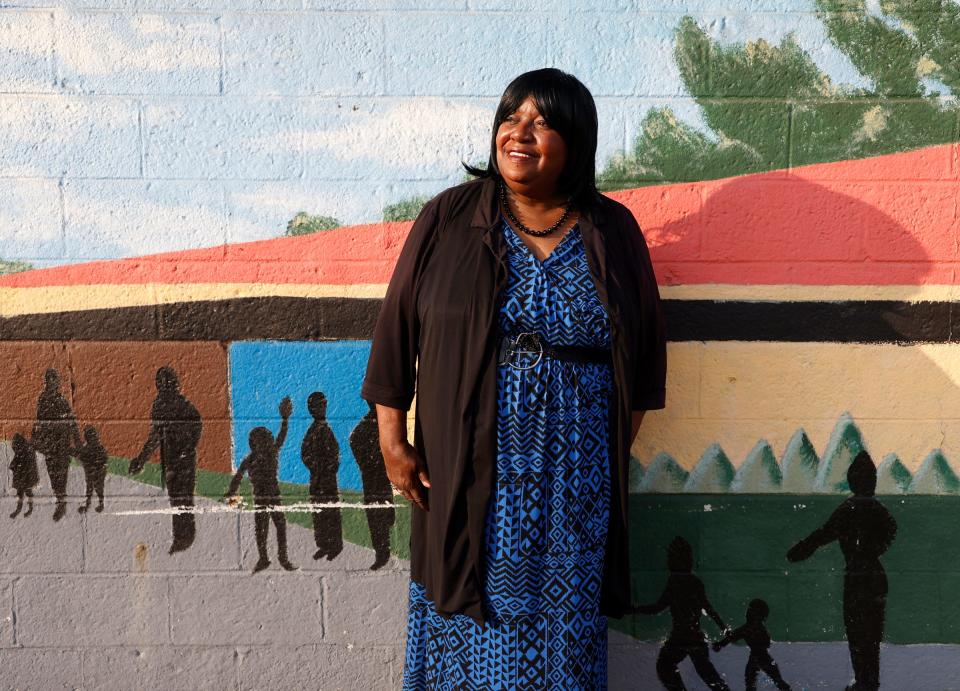She died after lifelong push to gain reparations for Blacks, effort continues in Detroit
- Oops!Something went wrong.Please try again later.
Civil rights leader and former Detroit City Council member JoAnn Watson championed a route to social justice that ranks with affirmative action as among the most controversial approaches in the African-American struggle for civil rights: reparations.
According to the NAACP, “reparations would involve a national apology, rights to the cannabis industry, financial payment, social service benefits, and land grants to every descendant of an enslaved African American" or those descended from American Blacks who lived in the United States through "the Jim Crow era." That was the period of intense discrimination, lynchings and other violence from the 1870s through the 1960s, according to Ferris State University's online history of African American experience.

Watson helped build the NAACP’s membership during her historic leadership, 1990-1997, when she was the first woman appointed to head the Detroit branch, billed as the nation’s largest. After Watson's death on July 10, civil rights and political leaders praised her. More praise is sure to follow at a funeral service Saturday (see details below).
Although Watson only recently was appointed to co-chair Detroit’s new city council-based Reparations Task Force, she spent decades pursuing the dream of gaining financial compensation for American Blacks. From 1997 to 2002, she was public policy director for U.S. Rep. John Conyers, and she was said to play a crucial behind-the-scenes role in Conyers’ push for a commission to study and develop proposals for reparations. Conyers spent much of his career in Congress, year after year, trying to pass what he called House Rule 40, so named because it harkened back to one of history’s most famous broken promises: the 40 acres and a mules awarded by Union General William Tecumseh Sherman to emancipated slaves after the Civil War, then quickly revoked by President Andrew Johnson.
H.R. 40 was reintroduced in the 118th Congress in January, although its prospects for passage remain dim, according to the website of Network – Advocates for Justice, Inspired by Catholic Sisters. The Network site says that, "given the reality of the divided Congress," President Joe Biden should establish a reparations commission by executive order. Watson’s co-chair on Detroit’s Reparations Task Force, Keith Williams, said Watson’s example will live on.
More: Detroit City Councilwoman Joann Watson dies
More: Baseball-sized hail pummels parts of southeast Michigan
“We lost a queen but we gained her inspiration to keep it moving,” said Williams, in a statement sent to the Free Press, referring to the unending effort to gain reparations. Williams is chair of the Michigan Democratic Party’s Black Caucus. In March, the NAACP reaffirmed its stance in favor of financial reparations "for all African Americans who are descendants of slavery and the Jim Crow era,” the 8th time it has done so since 1997.
Funeral services are scheduled for 11 a.m. Saturday (family hour at 10 a.m.), taking place at Fellowship Chapel, 7707 West Outer Drive in Detroit. Services will be held there and not at Watson’s West Side Unity Church in Detroit, where she was senior pastor, because Fellowship Chapel has greater seating capacity, according to a funeral director at Swanson Funeral Home in Detroit.
Fellowship Chapel’s senior pastor is the Rev. Wendell Anthony, a longtime friend of Watson. Anthony succeeded Watson as head of the Detroit branch of the NAACP.
Anthony posted a statement about Watson soon after her death last week. He said she’d impressed him from the start, when both were students in the same high school in Detroit: “She showed me who she was as the editor for the Central Student, our high school newspaper.” Watson would go on to graduate from the University of Michigan with a major in journalism. In his statement, Anthony called her “Freedom Fighter, Writer, Orator, Organizer, Talk Show Host, Pastor, Wife, Mother, and Grandmother.”
Others who honored Watson’s life included State Rep. Karen Whitsett, D-Detroit. Whitsett praised Watson for among many things being a delegate to the United Nations World Conference Against Racism, held in South Africa in 2001. Detroit Mayor Mike Duggan called Watson “a fierce community advocate” who devoted her life to community service.
Contact Bill Laytner: blaitner@freepress.com. Contributing were staff writers Dana Afana and Niraj Warikoo.
This article originally appeared on Detroit Free Press: Detroit leader's funeral to recall civil rights and reparations push

